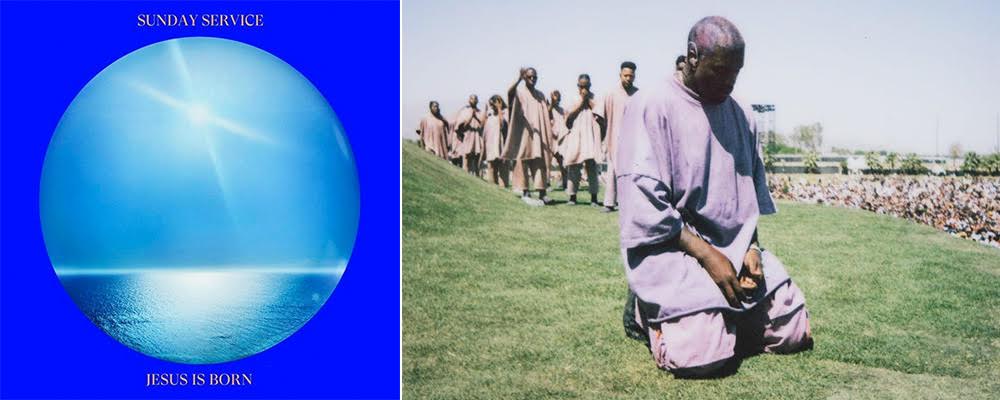Kanye West Presents Gospel With Hip-Hop Bombast on Sunday Service’s ‘Jesus Is Born’
Adi Mehta
In retrospect, Kanye West’s latest indulgence has been a long time in the making. The cover art for 2016’s “Life of Pablo” bore an aged photograph of an African American family wedding and one of a scantily-clad, voluptuous swimsuit model, both shabbily set on an orange background, alongside rows of lines reading, “Which / One.” The album was largely disjointed, but with flashes of brilliance, and the subject matter split the difference between gospel stylings, with their pious suggestions, and contemporary hip-hop in all its associated worldliness. The string of short, slapdash releases that followed West’s descent into mayhem, and October’s “Jesus Is King” marked West’s triumphant resurgence. The album prominently featured the Sunday Service Choir from West’s own church that he opened in January, and the music was halfway between gospel and hip-hop, with the former now more pronounced, and the subject matter purged of anything remotely suggestive. The inevitable next step was to extirpate all remaining traces of hip-hop — which has somewhat ironically come along with the withdrawal of West himself from the music. West’s latest offering, “Jesus Is Born,” released appropriately on Christmas day, and actually released on time in a demonstration of good Christian principle, is credited to Sunday Service, with West as executive producer. If West’s earlier albums were hip-hop vaguely inspired by Jesus, the new record is full gospel music, vaguely inspired by Kanye.
The song titles effectively convey what’s on display here. There are commands and calls to action – “Count Your Blessings,” “Lift Up Your Voices,” superlative expressions – “Excellect,” “More Than Anything,” and explicit affirmations – “That’s How the Good Lord Works,” “Satan, We’re Gonna Tear Your Kingdom Down.” The songs sound as you would expect from the four tracks from “Jesus Is Born” that prominently featured the choir. One cut, “Revelations 19:1” even recycles the “Hallelujah” chorus of “Selah” from “Jesus Is King,” but jettisons Ye’s quirky blurts and the ominous bass and thunderclaps, opting for more standard gospel fare. As such, it encapsulates the primary weakness of the album, at large. West seems to be steadily assuming form, conforming, and having now removed himself almost entirely from the recordings, he offers a relatively banal release that suffers in terms of novelty and personality. This shouldn’t be mistaken, however, for any atrophy of passion. Ye is a master of outdoing already excessive things, and he has done just that yet again with this album. Gospel is about proclaiming your faith and demonstrating your elation as loudly as possible, erupting into melismatic outpurings with the frenzy of sermon attendees speaking in tongues. West takes this up, and takes it a bit further.
The most interesting songs here are those that repurpose tracks from 2016’s “The Life of Pablo.” “Father Stretch” takes up a melody sampled in “Father Stretch My Hands, Pt. 1,” and fleshes it out naturally into a full song. It’s standard gospel, if you amped it up a bit extra, to the extent of trap-style shouts of “Hey” and football field bombast scattered atop the dense sheets of layered, impassioned vocals. The “Pablo” track stood out for its break, and the raw funk of the beat that followed, and the new song manages to mimic this effect with so much spirit and syncopation in the live instrumentation and boisterous choir. A reimagination that fares better yet is “Follow Me,” which changes lyrics like “I feel it fade” and “deep inside” to “We feel its faith” and “He’s alive.” While it’s easy to conserve vowel sounds and repackage them in words that suit the message of the day, the choir performs like they really mean it. The final third, the “He’s alive” portion, is a contemporary, urban example of the rapture that religious fervor has inspired through the ages. “Ultralight Beam,” already a full gospel track on “TLOP,” naturally appears here, although the new rendition could be a bit of a letdown, as it merely strips the track of its hip-hop elements without adding much.
Overall, “Jesus Is Born” is a relatively generic gospel album with a subtle, special edge about it. In a way, it’s in line with gospel’s historic role in musical traditions. Among the chief influences that gave rise to the blues is African American spirituals. The trajectory of secular and religious music in the culture has always been linked. An iced-out cross is nothing new, and neither is a rap song about debauchery and megalomania, credited to the inspiration of Christ. The reverse – squeaky clean music expressed with a decidedly hip-hop swagger – is a bit more rare. West’s contributions can be heard in the new songs’ bold excesses. All the indulgence of hip-hop is just rechanneled, and the singers and musicians could hardly sound more joyous. Parts of nearly every song literally sound like a celebration. An undertaking like this is ripe for satire, and the combined effect of its sincerity and outlandishness can be a bit hard to take. The singers on this recording really, really love Christ, and cannot stop telling us about it. In fact, the ludicrous repetitiveness and simplicity of sentiment speaks to the power of the message, as it’s hard to explain what, if not some supernatural force, motivates such a thing. Moreover, West’s complete 180, from caricature of hip-hop vice to paragon of Christian virtue is so surreal that it practically forces one to declare, “Praise the Lord.”
“Jesus Is Born” is available Dec. 25 on Apple Music.

